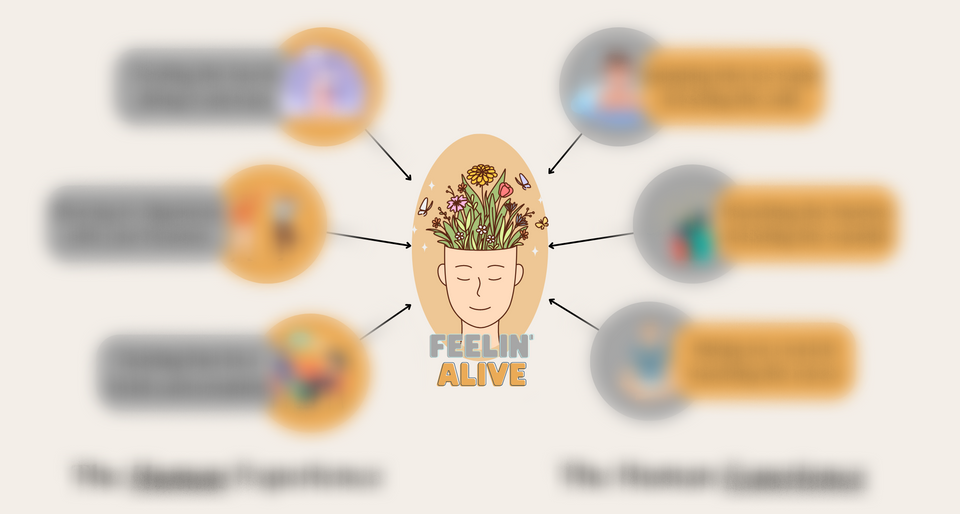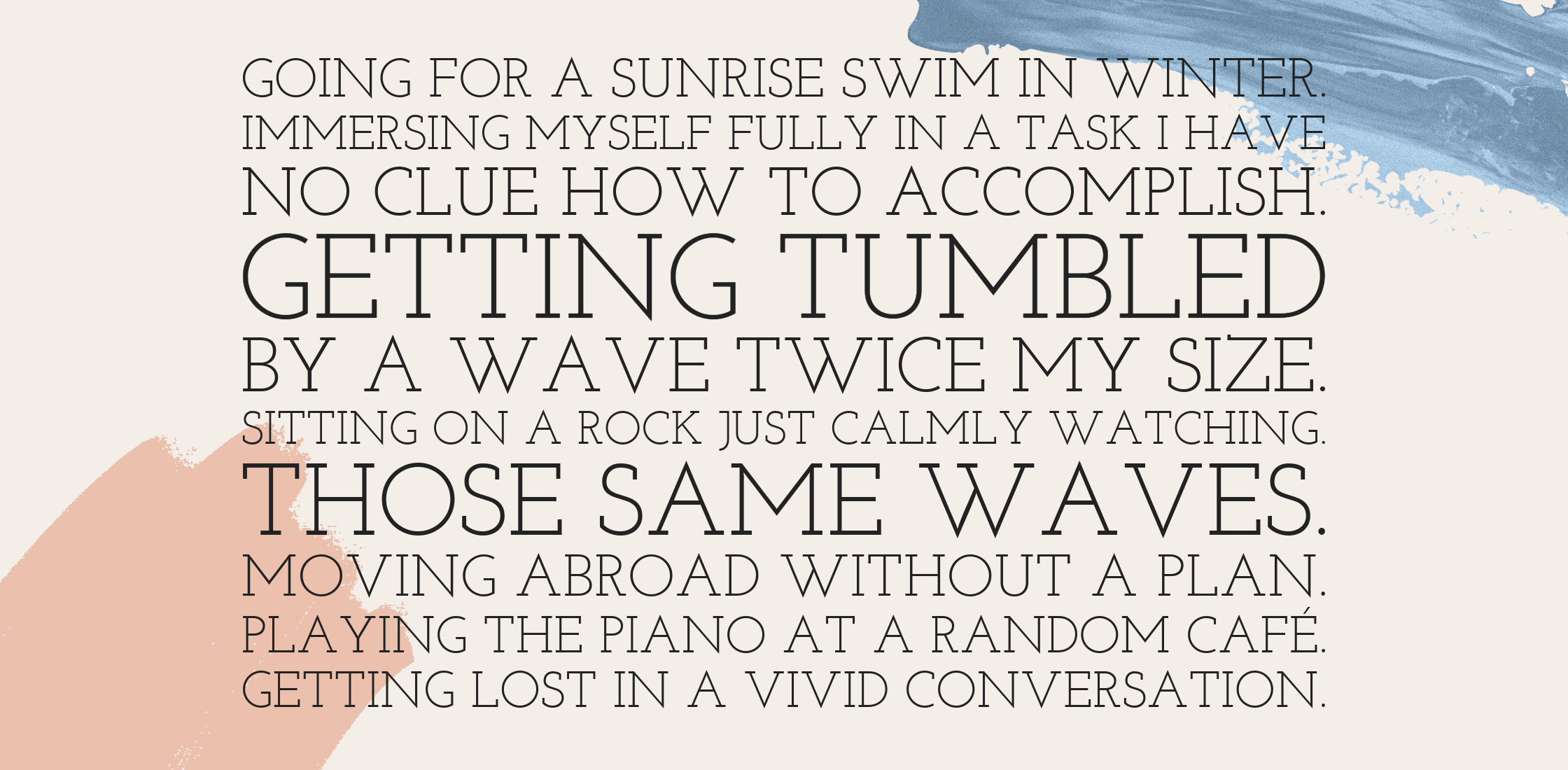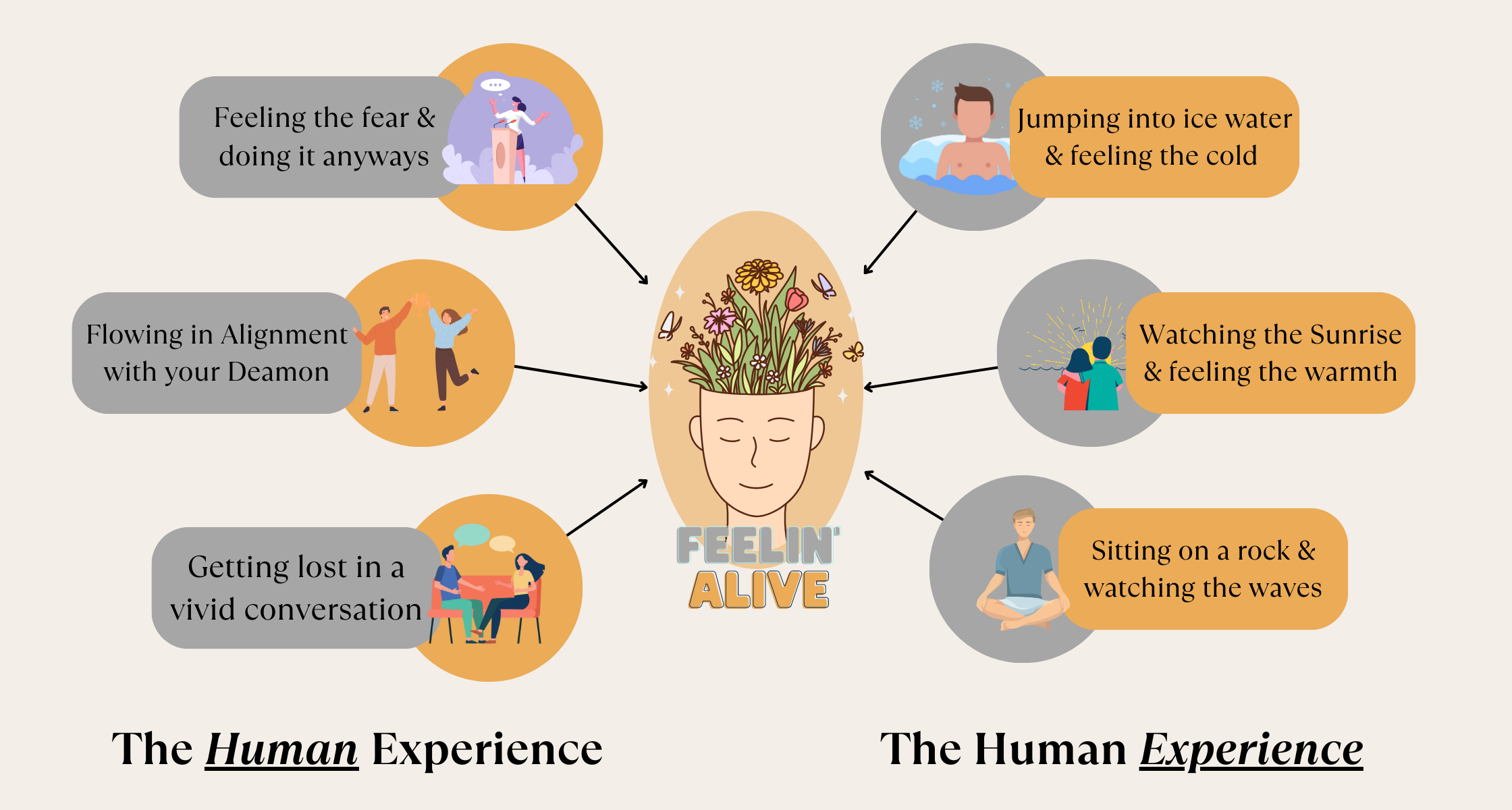Feelin' Alive: An Adventure

“I don't believe people are looking for the meaning of life as much as they are looking for the experience of being alive” - Joseph Campbell
Over the past few months, I’ve tried to learn viewing experiences in a very simple way: Is this part of a vivid life? If I imagine a full, authentic human life - is this experience part of it? If it is, I should be cool with. Instead of optimising for "productive", "positive" or plain "pleasant", the question becomes: Does it make me feel alive?

Great idea, I know. But this weekend, I realised that I've been flying blind. I have no idea what that actually means: "Feel alive". As a matter of experience, there’s a pretty big difference between getting absolutely smacked by a wave and calmly watching it from the shore, right? Still, they both make me “feel alive”.
People are willing to jump out of a plane to feel alive, others just play the guitar. A sunset can do it, as can a simple deep breath after it rained in the city. Not speaking from experience here, but heroine probably does it too.
So this week, join me on a little adventure. As I said, I have no idea yet - but I’m curious to find out: What does it mean to feel alive?
Let's start basic. What about the feeling that you're alive? That’s easy enough to find, right? Just check if you’re still breathing - if you are, you’re alive. There, you can feel it. Simple as that. But I’m afraid we can’t call it a day here. When people say something makes them “feel alive”, they rarely refer to their vital signs.
🎓 Academic Answers
What is it then? Well, I started out with my trusty friend SemanticScholar (basically Google for academic research). What I found was a landscape of results that was equally vivid (and similarly unhelpful) to my list of examples. A search for "feeling alive" returned research on:
- the relationship between physical activity and mental health,
- women’s motivations for engaging in left-wing terrorism,
- the socio-motivational impact of drama and theatre on marginalised young people
- the dynamics of adolescent violence
Each of these papers found “feeling alive” to be an essential mechanism to explain why people do what they do. Apparently, the reason why exercise helps people struggling with depression is the same reason why teenagers lash out in violence. It makes them feel alive.
But funny enough, none of these papers ever explained what they meant by “feel alive”. They all use the phrase assuming we all know what it means. So while it’s little help for a definition, what we can take from it is this: “Feeling alive” is one hell of a motivator. Skydiving, opioids & violence - people will really go to extreme lengths to feel alive. But then again, others will find it in the simple act of doing burpees or getting on a stage acting like you’re someone else.
If anything, I left SemanticScholar more confused than I started. This elusive idea of “feeling alive” seems to be inseparably tied to what we do & why we do it, but I find it hard to imagine that terrorism sparks the same feeling as a set of burpees.
In retrospect, it feels stupid to look for the answer to a question like “What does it mean to feel alive?” in science. But hey, worth a try. What next?
🏛️ Philosophical Pointers
Ah, yes. This seems more fitting, right? Let's just ask Philosophers. These guys should know all about the big questions. Only problem: instead of no answer, there's lots of different answers. Since we don’t have that kinda time, I just went on a little treasure hunt, picking bits & pieces from different schools in the hopes of patching together an approximation. Here’s what I found:
📐 Alignment
As one tends to when he wants to dive into philosophy, I started in ancient Greece. Here, we find the old gang of Socrates, Plato & Aristotle and their common brainchild: Eudaemonia. Combining the prefix eu (which means good, or well), and daemon (which means spirit), we arrive at the highest aim of human behaviour and the source of true contentment: Acting in alignment with one’s best self.
The idea has found its way deep into the modern psychological understanding of well-being. Ask Deci & Ryan (who any psych student will recognise from their groundbreaking work on Self-Determination Theory) and they’ll tell you that:
“well-being is not so much an outcome or end state as it is a process of fulfilling or realizing one’s daemon or true nature - that is, of fulfilling one’s virtuous potentials and living as one was inherently intended to live.”
After all, where do you think the last step on Maslow’s famous pyramid - Self-Actualisation - comes from? According to this school, it is when we are in alignment with our daemon (aka spirit / true nature) that we feel truly alive. Those moments, therefore, teach us about our inherent nature. If you feel incredibly alive getting lost in a discussion about architecture while others would fall asleep - that’s probably a matter of alignment.
Lovely stuff. Now we can explain why people feel alive when they’re in a flow state, applying themselves fully. If we agree that human connection is part of our fundamental nature, “a lively conversation” is just two people fully alive. So are we done?
Well, I think it’d be a stretch to say that “my inherent nature is sitting on a rock watching the waves”. Still, I feel very much alive when I do. So what’s up with that?
⛰️ Attention
As great as our Greek homies were, they weren’t the only ones thinking about life. Right around the same time, people were sitting on a mountain peak in the Himalayas feeling about as alive as you can imagine. Enter Buddhist Philosophy.
Instead of finding aliveness in doing stuff, preferably in alignment with the ‘ol daemon, they chose the exact opposite. They just took my “Surely it’s not just checking if you’re still breathing” quip and answered a decisive “Yeah, buddy. It is.”
The practice of Zen Buddhism revolves around recognising that very aliveness in every single thing you do. Hence the classic Zen saying:
Before enlightenment; chop wood, carry water.
After enlightenment; chop wood, carry water.
The idea: Any moment spent chasing this elusive “feeling of aliveness”, you’re not feeling alive. As the saying goes: You’re missing the forest because of all the trees. Literally - go sit in a forest, breathe in the air, and you’re alive. Right there.
It only took a couple thousand years, but as the industrial revolution began to pick up steam (pun intended) and cities began to sprawl, Western Philosophers started to dabble with the same ideas. In a sort of countermovement to the hectic, striving & growing life that came with factories, the school of Transcendentalism dove back into Man's connection with his environment. For Example, Ralph Waldo Emerson (19th Century American Philosopher) writes in his magnum opus Nature:
Live in the sunshine, swim the sea, drink the wild air… It is not the length of life, but the depth.
According to this school, the only prerequisite for feeling alive is your attention. It’s that simple:
So, here we have some wise people saying you have to act in alignment with your spirit to truly feel alive - and others saying you don't have to do anything special because the feeling is always there! At this point, I'm struggling. Which one is it? Well:
I've been saying this for ages thanks to my dear friend Emma, but it wasn't until today that I found out where it comes from. Maybe my most profound discovery today...
❓Porque no los dos?
Why can't we have both? That’s what my fellow German Martin Heidegger said. He was associated most closely with the school of Phenomenology (the study of structures of consciousness as experienced from the first-person point of view) - exactly what we need. But you can probably tell from the name that his stuff gets super funky & abstract, so I’ll try to keep it as simple as the matter allows.
Heidegger saw the human experience as the intersection of Leben and Erleben. There’s no perfect translation for these words, but let me try my best:
Being human, then, is both the act of existence (very factual: you eat, you move, you metabolise, ...) and the subjective experience (dreams, goals, thoughts, ...).
As a result, feeling alive also has two facets: vitality (the continuous bodily background feeling) and conation (the experience of drive, instinct, affect & will). Sound familiar?
When you’re in flow, doing your best work in alignment with your daemon, you’re experiencing peak conation. The same goes for vivid conversation, playing the guitar or doing something you were scared of. It’s the experience of intentional action that makes you feel so very human - feel alive.
When you’re sitting on a rock in meditation, that’s pure vitality. Simply bringing awareness to all the sensations - the sound of waves, the feeling of breathing, water splashing on your arm - are a way to tap into proof that you’re here - that you exist. Adrenaline-driven "feel-alive" moments just turn vitality up to 11 - nothing pulls you into the present quicker than falling out of a plane or getting spun around by a house-sized wall of water.
At least that's how I make sense of it now. Obviously, I'm not gonna sit here and claim that I figured out what "feeling alive" means. I'll let real philosophers do the hard work on that. Instead, what I left this adventure with was a simple framework:

🤝 The Human Experience
When we do something big we thought we couldn't, that makes us feel alive. Losing yourself in action, fully aligned with who you are - this is a profoundly human thing. As is genuine connection through conversation. Learning something new, discovering the fire you have within. Getting over yourself to accomplish a goal - or just to say you did it. Either way, putting intention into action: Heidegger calls it conation, but I find that's hard to remember. I just call it the human experience.
Funny enough, it is precisely in these moments that we completely forget the other side. Diving completely into the flow state, I remember days where I'd disappear completely for hours only to realise I haven't eaten in forever. Still, I feel incredibly alive. Or think of that wonderful moment when you chat with a friend only to check the time and realise it's been four hours. Surely, you weren't thinking about the sensations in your big toe. You were gone in the human experience. Feeling alive in your mind.
🌊 The Human Experience
And then, there's the other side. The proof that you're here. Sunlight on your face, cold water washing over your feet, the smell of rain in your nose. In meditation, even an itch on your ear will spark this feeling: Heidegger calls it vitality, I just call it the human experience. The experience that you're alive.
Funny enough, it is in these moments that we lose track of the other side, too. All those beautiful human tendencies: Goals, Dreams, Aspirations - they're put on pause in a cold plunge. No one ever worried about next week's quarterly earnings presentation while being wiped out by a massive wave. For that slight moment, you're just here. Feeling alive in your body.
🫶 Now what?
I came into this exploration, wanting to understand what we mean by "feeling alive". What I found wasn't an answer, but really two. Two sides of the same coin, rather inseparable. On the surface, they seem separate: One loses track of sensation, the other revolves around it. But really, they're just two approaches to get to the destination. What do the flow state, the meditative state and a vivid conversation have in common?
They bring you to fully to the present. Feeling fully alive, then, is a matter of opting in completely to your experience. Heightened senses and a disregard for the past & future. One approach isn't better than the other, it's really just a choice of how you want to get there. "There" being here, where you are already.

Comments ()